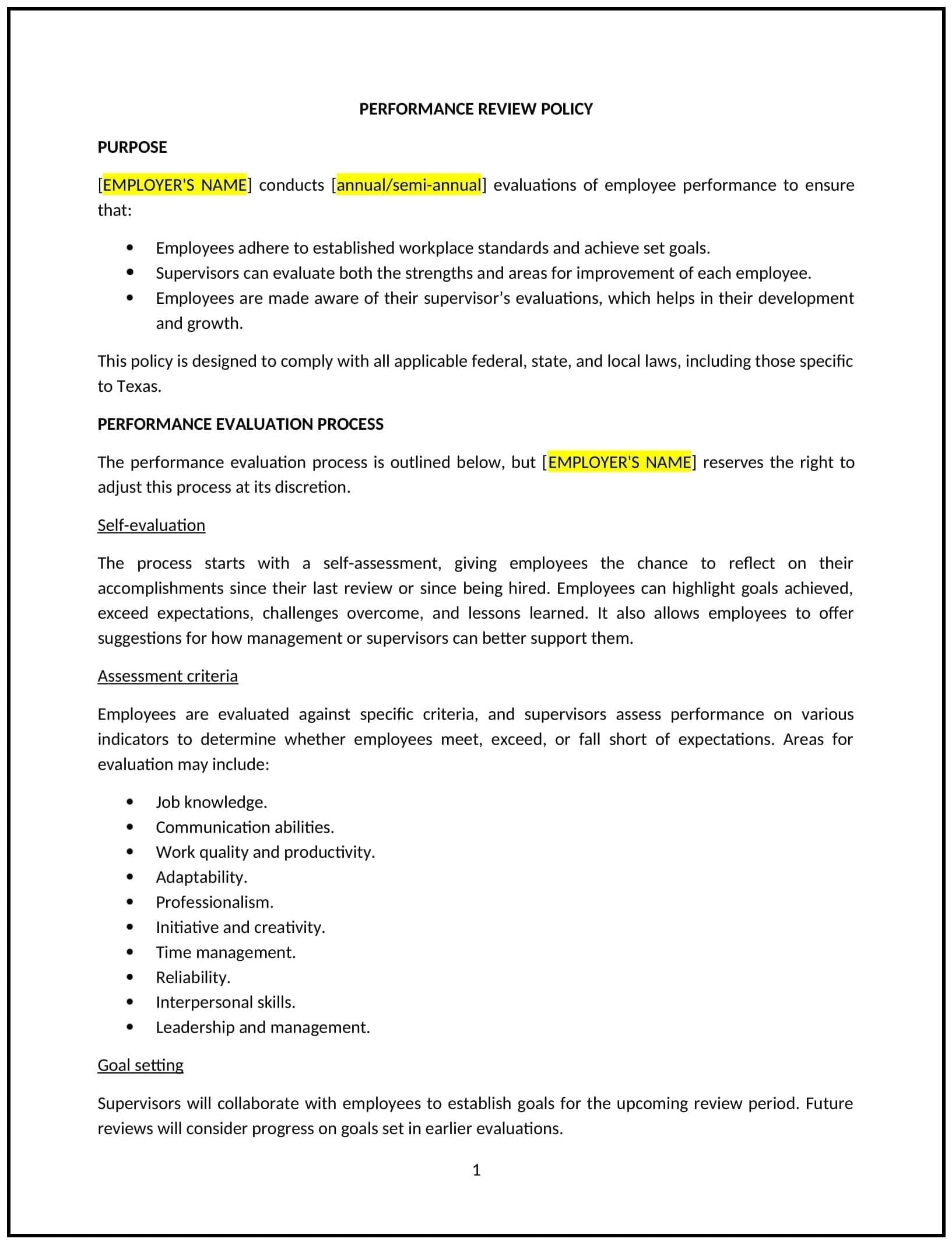Got contracts to review? While you're here for policies, let Cobrief make contract review effortless—start your free review now.

Customize this template for free
Performance review policy (Texas)
This performance review policy is designed to help Texas businesses establish clear guidelines for evaluating employee performance. The policy outlines the process, frequency, and criteria for performance evaluations, as well as how feedback is communicated and used to support employee development.
By adopting this policy, businesses can promote fairness, accountability, and transparency in performance evaluations, while fostering a culture of continuous improvement and growth.
How to use this performance review policy (Texas)
- Define performance criteria: Specify the key performance indicators (KPIs), competencies, and goals that will be used to evaluate employee performance. This can include job-specific tasks, productivity, teamwork, leadership, and other relevant factors.
- Set evaluation frequency: Outline the frequency of performance reviews, such as annual, semi-annual, or quarterly evaluations. The policy should clarify whether employees will be reviewed on a set date or based on their hire date.
- Identify review participants: Define who will conduct the performance reviews, such as direct supervisors, managers, or HR personnel. The policy should ensure that evaluations are based on objective criteria and feedback from relevant stakeholders.
- Address self-assessments: If applicable, allow employees to participate in the evaluation process by completing self-assessments. This gives employees the opportunity to reflect on their own performance and contribute to the feedback process.
- Set expectations for feedback: Clarify how feedback will be provided during the review process. Feedback should be constructive, specific, and focused on both strengths and areas for improvement.
- Link performance reviews to development: Specify how performance reviews will be used to inform employee development, including setting goals, identifying training opportunities, and making decisions about promotions or raises.
- Address performance improvement: Provide clear guidelines for addressing underperformance, including offering support, setting improvement goals, and implementing performance improvement plans (PIPs) if necessary.
Benefits of using this performance review policy (Texas)
This policy offers several benefits for Texas businesses:
- Promotes fairness and consistency: By establishing clear performance criteria and processes, businesses can ensure that all employees are evaluated fairly and consistently, based on the same standards.
- Enhances employee development: Regular performance reviews help employees understand their strengths and areas for improvement, guiding their professional development and career growth.
- Increases employee motivation: When employees receive constructive feedback and recognition for their contributions, they are more likely to feel valued and motivated to perform at a higher level.
- Supports talent retention: A structured performance review process helps identify high-performing employees who may be eligible for promotions or salary increases, fostering employee loyalty and retention.
- Improves company performance: Performance reviews allow businesses to identify and address performance issues early, improving overall productivity and helping the company achieve its strategic goals.
- Provides legal protection: Documenting the performance review process and maintaining records helps ensure that evaluations are conducted fairly and without discrimination, reducing the risk of legal disputes.
Tips for using this performance review policy (Texas)
- Communicate the policy clearly: Ensure that all employees understand the performance review process, the criteria used to evaluate their performance, and how feedback will be provided.
- Offer training for managers: Provide training for managers on how to conduct effective performance reviews, deliver constructive feedback, and handle difficult conversations.
- Set clear expectations: Clearly communicate the company’s expectations for employee performance at the beginning of the review period, and provide ongoing feedback throughout the year.
- Use performance reviews as a tool for growth: Focus on using performance reviews to support employee development, set new goals, and offer opportunities for skill-building and career advancement.
- Be consistent: Apply the performance review process consistently across all employees to ensure fairness and transparency.
- Document evaluations: Keep detailed records of performance reviews, feedback provided, and any action plans or goals set during the evaluation process to support ongoing performance management.